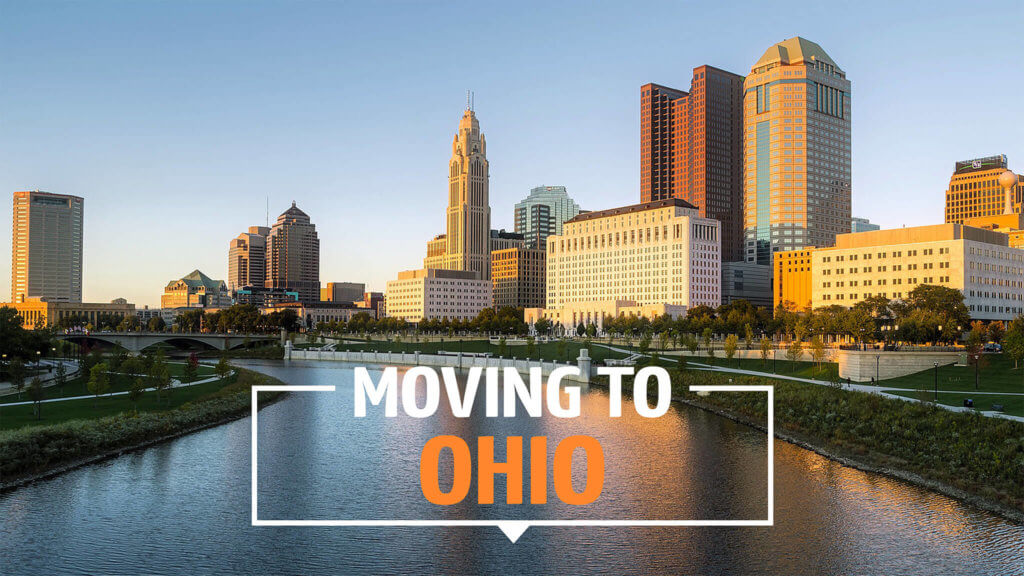If you are moving to Ohio then you are at the proper place where you can explore more information about it. Ohio is one of the popular states in the US is located in the mid-northeastern region of the US. Ohio, also known by its nickname “The Buckeye State”, is the seventh most populous state in the US.
There are many wonderful aspects about this state that attracts many of the people outside for relocation to Ohio. The lower cost of living than the national US average makes it easy to make the decision to come here.
The job market is very good in Ohio State with opportunities in several sectors. Cincinnati and Columbus have many of the top employers which are providing high-paying job opportunities. Ohio has six slabs for the income tax rates with the sales tax of the 5.75%.

There are some nice colleges here which provide a better quality of education. Talking from the safety point-of-view, Ohio has a lesser crime rate and is safe to live. Some stunning natural landscapes here are better for spending your holidays. You can explore some more information about the several aspects of Ohio state here.
Cost of Living
According to world population review, Ohio’s cost of living index is 90.8. It is comparatively lower than the united states index average of 100.

In Ohio, living costs are lower than in the United States in general. Based on data from the Bureau of Economic Analysis, the cost of living in the state averages 11.6% lower than the national average. The cost of living in Ohio is the eighth-lowest among all the states.
The state of Ohio has 11 metropolitan areas. Columbus has the highest cost of living in the state, where the cost of living is 8.1% lower than the national average and 3.5% higher than the statewide average.
| Ohio | US | |
|---|---|---|
| Median Home Value | $140,000.00 | $204,900.00 |
| Median Monthly Rent | $788.00 | $1,023.00 |
| Average Car Insurance | $1,558.00 | $1,517.00 |
| Healthcare cost for Single Adult | $3,720.00 | $4,266.00 |
| Healthcare cost for family of four | $11,331.00 | $12,950.00 |
| Food cost for Single Adult | $2,985.00 | $3,240.00 |
| Food cost for family of four | $8,621.00 | $9,354.00 |
| Annual Child care cost | $7,857.00 | $8,903.00 |
| Annual Taxes | $4,829.00 | $6,542.00 |
Job market
According to U.S. News, Ohio ranks 39 in the nation for employment.
In Ohio, the average household income is $74,109 While the median household income is $54,533

The most wanted job in Ohio is Physician assistant With an Average annual salary of $105,410
According to the U.S. Bureau of Labor Statistics reports, Ohio’s current unemployment rate in February 2021 was 5 %, which is lower than the 6.2% average Unemployment Rate in the United States.
It is 22.6x more common for a worker in Ohio to be a State Tested Nurses Aide (STNA) than all U.S. workers.
The Most Common Jobs in Ohio
| Rank | Job | Local Jobs | Mean Local Salary |
|---|---|---|---|
| 1 | Retail salespersons | 144,100 | $22,475 |
| 2 | Cashiers | 120,760 | $16,073 |
| 3 | Laborers and freight, stock, and material movers, hand | 114,670 | $23,503 |
| 4 | Registered nurses | 95,290 | $52,537 |
| 5 | Combined food preparation and serving workers, including fast food | 88,400 | $14,709 |
| 6 | Office clerks, general | 88,220 | $22,484 |
| 7 | Waiters and waitresses | 84,920 | $14,095 |
| 8 | Customer service representatives | 83,900 | $28,590 |
| 9 | Janitors and cleaners, except maids and housekeeping cleaners | 74,860 | $22,722 |
| 10 | Nursing aides, orderlies, and attendants | 61,210 | $21,950 |
Highest-paying jobs in Ohio
| Rank | Job Description | Average Salary i | Entry Level Salary i |
|---|---|---|---|
| 1 | General Internal Medicine Physicians | $189,680 | $61,770 |
| 2 | Chief Executives | $185,000 | $68,010 |
| 3 | General Dentists | $184,990 | $72,920 |
| 4 | Family Medicine Physicians | $180,210 | $56,650 |
| 5 | Orthodontists | $175,590 | $56,680 |
| 6 | Nurse Anesthetists | $168,070 | $126,610 |
| 7 | General Pediatricians | $156,970 | $63,770 |
| 8 | Podiatrists | $138,720 | $59,720 |
| 9 | Air Traffic Controllers | $137,760 | $69,900 |
| 10 | Architectural and Engineering Managers | $130,040 | $90,750 |
Top employers
| # | Employer | City |
|---|---|---|
| 1 | Ohio State University | Columbus |
| 2 | GE Lighting Div | Cleveland |
| 3 | Procter & Gamble Co | Cincinnati |
| 4 | University-Cincinnati Geology | Cincinnati |
| 5 | University of Cincinnati | Cincinnati |
| 6 | Tri Health | Cincinnati |
| 7 | Cleveland Clinic Health System | Cleveland |
| 8 | Nationwide Mutual Insurance Co | Columbus |
| 9 | O Su Outpatient Rehab Ctr | Columbus |
| 10 | Ohio State Univ Hosp East | Columbus |
Tax rates
Gradually each year since 2005, Ohio’s state income tax has decreased. You can expect to pay the top rate of 4.797% in 2020, which you will file in the first quarter of 2021. The state of Ohio, all alone, would have a lower income tax rate than other states, but nearly half of Ohio’s municipalities impose income taxes as well.

Similar to Ohio, the statewide sales tax is 5.75%, but when you add the county rates between 0.75% and 2.250%, you get an average sales tax rate of 7.17%. Sales tax rates in this area are the 21st highest in the nation.
Ohio taxpayers on average pay a little bit more in state and local taxes than the national average, but that burden varies based on which city or county they reside in.
Ohio income Tax:
Ohio state is applicable to dividends and interest income. Ohio State has a progressive tax structure. Ohio state tax is divided into 6 brackets with tax rates of 0%-4.797% applicable on income range of $22,150-$221,300.
Ohio Sales Tax:
Ohio State is ranked 27 nationwide. In Ohio, the state sales tax is 5.75% and the average local tax rate is 1.42%.
Ohio Property Tax:
According to the U.S. Census Bureau, Ohio state’s median property tax is $ 2,032 with an effective property tax rate of 1.54 %.
Ohio Gas Tax:
Ohio State has a $0.385 / gallon gasoline tax and a $0.47 / gallon diesel tax.
Ohio Cigarettes Tax:
Ohio State ranks 29th out of 50 states in the cigarette tax. In Ohio, the cigarette tax per pack of 20 is $1.60.
Economy
Ohio is currently ranked 29th for its economic outlook and 36th for economic performance rank.
Among US states, Ohio has the 6th highest economic exposure to COVID-19, as measured by the percentage of its employees working in sectors with a High or Medium-High level of COVID-19 exposure.

These sectors employ a total of 1,039,278 people.
3,649,204 employees in Ohio are employed in sectors that have a high or medium degree of exposure to COVID-19, which totals 59% of all employees.
The state of Ohio is home to 11 689,100 residents and its population has increased 0.1% annually in the last year. It ranks 34 according to the United States Census Bureau.
According to the U.S. Census Bureau, Ohio’s gross state product (GSP) in 2019 reached $615.6bn, up by 1.5% in the five years to 2019. Its growth ranks 30th out of all 50 states.
Education
According to U.S. News, Ohio is ranked 31st overall in the United States education system, 35th for higher education and 20th for Pre-K-12. Ohio is ranked 33rd for quality of education in public schools among all 50 states by WalletHub.

Ohio schools spend $13,027 per pupil for a total of $20.7 billion annually. That’s the equivalent of 3.8% of taxpayer income. 132,360 college students graduate annually in Ohio.
The cost of the average community college in Ohio is $3,780 for In-state tuition and $7,680for out-of-state tuition. In Ohio, public university costs $22,818 which is more than the national average of $21,216.
| Rank | 17 |
|---|---|
| State | Ohio |
| In-State Total | $22,818 |
| In-State Tuition & Fees | $10,370 |
| Room & Board | $12,448 |
| Out-Of-State Tuition & Fees | $25,188 |
Top 10 Colleges in Ohio
- Ohio State University – Columbus, OH
- Kenyon College – Gambier, OH
- Oberlin College – Oberlin, OH
- Denison University – Granville, OH
- Cedarville University – Cedarville, OH
- Case Western Reserve University – Cleveland, OH
- The College of Wooster – Wooster, OH
- Ohio Northern University – Ada, OH
- Franciscan University of Steubenville – Steubenville, OH
- Miami University-Oxford – Oxford, OH
Housing prices
A median home in Ohio is worth about $145,000 and has a living space of 1,543 square feet. As a result, the average home in Ohio is worth over $100,000 less than the average home across the country.

Property taxes in Ohio are much higher than those in other states on this list, coming in at 1.58%. Based on Ohio’s median home price, this translates into state property taxes of about $2,205.
In the Columbus metro area, the median home value is $214,638. Ohio Realtors report that 2,542 homes were sold in Columbus in May for an average price of $258,688.
With mortgage rates as low as they’ve ever been combined with a relatively low cost of purchasing a home, you might be surprised how affordable it is to become a homeowner in Ohio right now. Your monthly cost of homeownership could be significantly lower than renting even if you do not have a large down payment.
According to homesnacks.com here are the
Most Affordable Places To Live In Ohio
- Martins Ferry
- Wapakoneta
- Bellevue
- Kenton
- Clayton
- Clyde
- Coshocton
- Hubbard
- Fostoria
- Trenton
Most expensive places to live in Ohio for 2023
- Oxford
- Beachwood
- Athens
- Bowling Green
- Kent
- Willoughby Hills
- Aurora
- Cincinnati
- Columbus
- Oberlin
Weather
The climate of Ohio is humid continental in the northern and southern parts of the state and humid subtropical in the extreme south. There is a heatwave in Ohio during the summers, with temperatures rising to 90°F (32.22°C) on average during the hottest week of July.

Nights in the North during January are colder than minus 15°F (-9.4°C) with nights dipping below 15°F (-9.4°C). During spring, temperatures are warm, but there is a higher probability for tornadoes and thunderstorms. Summer weather is generally hot and sunny, but autumn is cloudy and cooler.
Throughout the year, Ohio has an annual average rainfall of 38″ (965mm). Thunderstorms are a significant part of the rainfall during the rest of the year, while cyclones might contribute to the rainfall from October to March.
In October, the wettest month, and April the driest, there are an average of 2″ (50.8mm) of rainfall per month.
Ohio receives 2200 hours of sunshine annually. In the south, snowfall can range up to 16 inches (406.4mm) and up to 35 inches (889mm) in the northwest. September and October are hot, and January can be downright cold.
Weather hazards
Oh is prone to thunderstorms, floods, earthquakes, cyclones, tornadoes, and snowstorms. Snowmelt and heavy rainfall in spring and summer result in floods due to excessive rainfall in winter.

Fault lines in the Southern Great Lakes and Western Ohio are caused by the presence of numerous fault lines which often produce earthquakes of low intensity. The wind speed from 110mph (321.9km/h) and above is the reason for greater mortality in tornadoes. High winds, hail, and tornadoes are the main cause of damage.
Pros and Cons of Living in Ohio
Pros
- Amusement Parks
It is home to some of the best amusement parks in the country and is known as the Roller Coaster Capital of the World.
- Stunning natural landscape
The state of Ohio boasts around 110 natural lakes, mountains, flowing rivers, waterfalls, beautiful fall foliage, and a stunning landscape.
- Four Seasons
Ohio experiences all four seasons throughout the year and is known for colorful fall foliage across the country.
- Lower cost of living
The overall cost of living in Ohio is 82.6, making it one of the affordable US states to live in. Moreover, it is counted amongst the top three states for cheap housing in the country.
- Far away from natural disasters
Ohio is listed amongst the top five safest states to live in the country when it comes to natural disasters like hurricanes, tornadoes, and earthquakes.
- Low Unemployment rate
The state’s unemployment rate stands at 4.9% which is way lesser than the country’s average. Its job market has increased by 0.4% over the last year.
- Lower Tax Rates
The combined sales and income tax rates in Ohio are about 10.7% (well below the nationwide average of 11.9%).
Cons
- Low cultural diversity
Ohio is one of the US states that lack cultural and ethnic diversity. According to WalletHub, this state is counted amongst the top 10 least diverse states in the country.
- Low household income
The average income of an Ohio resident is about $26,520 a year (The US average is $28,555) and the median household income of the state is $48,849 per year (the US average is $53,482).
- Weather Conditions
The unfavorable weather is the major concern while living in Ohio. Summers are known to be humid and warm while winters are filled with heavy snowfall and blizzards.
- Political Influence
This state is flooded with politicians, political promotions, advertisements, and election cycles. All such things lead to tension and clashes among the residents.
- Dangerous Sports Fans
It is home to the nation’s most bothersome fans as they are rowdy and even dangerous.
- Crime Rate
The overall crime rate in Ohio is slightly higher than the country’s average. Also, this is the birthplace of some infamous serial killers.
- Weird laws
Like other US states, Ohio is also home to several bizarre laws. For instance, you cannot fish for whales on Sunday, women cannot wear patent leather shoes in public, etc.
Things to Do in Ohio
- Rock & Roll Hall of Fame
- Cincinnati Zoo & Botanical Garden
- Franklin Park Conservatory and Botanical Gardens
- Cleveland Museum of Art
- West Side Market
- Hocking Hills State Park
- Cedar Point
- A Christmas Story House
- National Museum of the US Air Force
- Toledo Museum of Art
- Great American Ball Park
- Stan Hywet Hall & Gardens
- Cincinnati Art Museum
- Easton Town Center
- Amish Country
- Perry’s Victory & International Peace Memorial
- American Sign Museum
- Kings Island
- Toledo Zoo
- Pro Football Hall of Fame
Conclusions
The information given above can help you to make the necessary preparation while moving to Ohio. The lower cost of living in the state makes it easier for the people to live comfortably here. The nice job opportunities in the state attract many people to live here.
Some better quality hospitals here can ensure nice healthcare facilities availability. This state is also a tax-friendly state and the economy is showing nice progress in the past few years. The lower housing rates can easily get you a house for either live by buying or rent.
The weather is very favorable here where a warm atmosphere is experienced during the summer and a little cold is experienced during the winter season. As living in Ohio is very pleasant, many people plan to spend their retirement life here. Come to this beautiful state of Ohio for having a better living standard.
